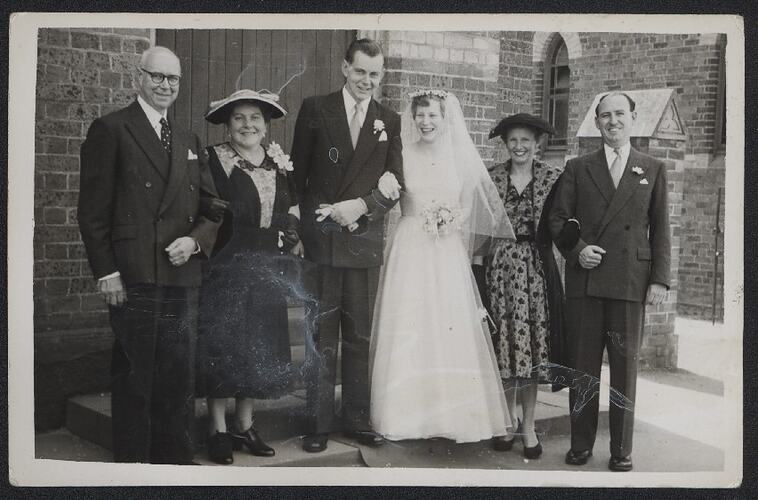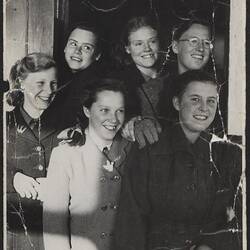Summary
Photograph of Sheila and Eric Philpott's wedding party on a church's steps, Melbourne, Australia, 22 January 1955. The group, from left to right, comprises, Arthur Philpott and Eva Philpott, Eric Philpott, Sheila Philpott (nee Bannister), Mrs Barrett and her husband, Dr Barrett, Sheila's former employers. Dr Barrett gave Sheila away at her wedding ceremony.
Part of a collection of documents, photographs and an oral history inteview relating to Shelagh (formerly Sheila)Philpott (nee Bannister), an unaccompanied British child migrant. The material documents her time in care in the National Children's Home and Orphanage in England at Bramhope, near Leeds; her migration to Australia in 1950 and her efforts to trace her family later in life. The research file includes photocopied material.
Description of Content
Group of six people, three men and three women, shown standing full-length side by side with arms linked facing the photographer. The brick walls and timber doors of a church are immediately behind the group. The men are wearing double-breasted dark suits, white shirts and ties, the bride is in a full-length white, waisted dress with a veil and a floral bouquet and the other two women are wearing below-the-knee dresses, wide-brimmed hats, gloves and black shoes. There is a penciled inscription on the reverse.
Physical Description
Black and white photograph
Significance
Statement of Historical Significance:
This collection documents the experience of an unaccompanied British child migrant who was relocated to Australia under the UK child migration programmes of the post War period, and to whom an apology was formally made in 2010 and reparations made under the UK Child Migrants Fund in 2019.
The documents are enriched by an oral history interview of the former child migrant, now in her eighties. The material covers the period before her migration as well as the lengthy period in Australia when she suffered from the ongoing impact of that migration programme. It documents her later return as an adult to England to find her family and her mental struggle with her identity. The material includes items showing the part played by local Australian social welfare organisations and their relationship to the after-care efforts of the UK National Children's Home.
More Information
-
Collecting Areas
Home & Community, Migration & Cultural Diversity, Childhood, Public Life & Institutions
-
Person Depicted
Mrs Shelagh Philpott, Melbourne, Victoria, Australia, 22 January 1955
-
Person Depicted
-
Format
Photograph, Black & White
-
Inscriptions
On reverse: [in pencil] 'AR0907 / IB321 / 10X'
-
Classification
-
Category
-
Discipline
-
Type of item
-
Image Dimensions - Photograph
140 mm (Width), 90 mm (Height)
-
Keywords
Child Welfare, Childcare, Childhood, Children's Homes, Motherhood, English Immigration, British Immigration, British Empire, British Commonwealth, Welfare, Wedding, Wedding Costumes, Marriage Customs & Rites, Churches, Hats, Women's Clothing

